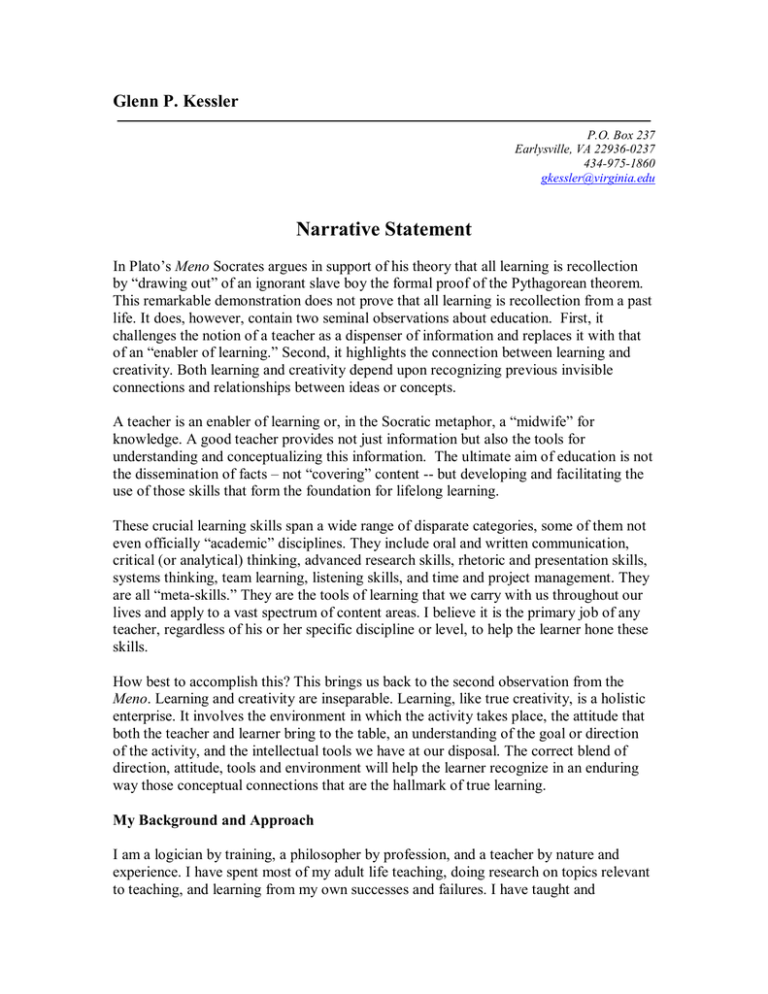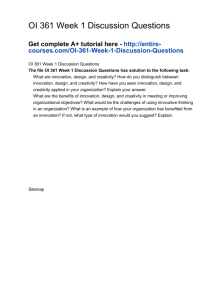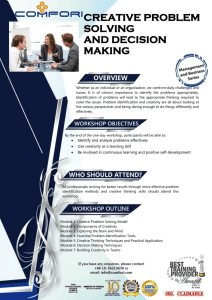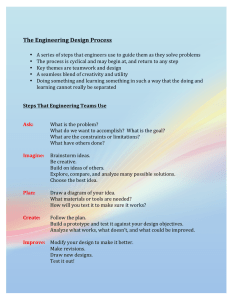Narrative Statement Glenn P. Kessler
advertisement

Glenn P. Kessler P.O. Box 237 Earlysville, VA 22936-0237 434-975-1860 gkessler@virginia.edu Narrative Statement In Plato’s Meno Socrates argues in support of his theory that all learning is recollection by “drawing out” of an ignorant slave boy the formal proof of the Pythagorean theorem. This remarkable demonstration does not prove that all learning is recollection from a past life. It does, however, contain two seminal observations about education. First, it challenges the notion of a teacher as a dispenser of information and replaces it with that of an “enabler of learning.” Second, it highlights the connection between learning and creativity. Both learning and creativity depend upon recognizing previous invisible connections and relationships between ideas or concepts. A teacher is an enabler of learning or, in the Socratic metaphor, a “midwife” for knowledge. A good teacher provides not just information but also the tools for understanding and conceptualizing this information. The ultimate aim of education is not the dissemination of facts – not “covering” content -- but developing and facilitating the use of those skills that form the foundation for lifelong learning. These crucial learning skills span a wide range of disparate categories, some of them not even officially “academic” disciplines. They include oral and written communication, critical (or analytical) thinking, advanced research skills, rhetoric and presentation skills, systems thinking, team learning, listening skills, and time and project management. They are all “meta-skills.” They are the tools of learning that we carry with us throughout our lives and apply to a vast spectrum of content areas. I believe it is the primary job of any teacher, regardless of his or her specific discipline or level, to help the learner hone these skills. How best to accomplish this? This brings us back to the second observation from the Meno. Learning and creativity are inseparable. Learning, like true creativity, is a holistic enterprise. It involves the environment in which the activity takes place, the attitude that both the teacher and learner bring to the table, an understanding of the goal or direction of the activity, and the intellectual tools we have at our disposal. The correct blend of direction, attitude, tools and environment will help the learner recognize in an enduring way those conceptual connections that are the hallmark of true learning. My Background and Approach I am a logician by training, a philosopher by profession, and a teacher by nature and experience. I have spent most of my adult life teaching, doing research on topics relevant to teaching, and learning from my own successes and failures. I have taught and mentored in academic, corporate and managerial settings. My research has spanned educational theory, organizational behavior, theories of learning organizations, creativity theory, systems thinking, and philosophy. I am and have always been motivated by a desire to help others expand and deepen their knowledge of the world and of themselves. This is a continuous thread that runs throughout several very different careers. At the University of Virginia this desire manifested itself in a number of highly successful undergraduate courses including a Forms of Reasoning course that generally benefited three to four hundred students a semester. Nearly twenty years later I still have former students stop me on the street in Charlottesville to discuss the impact the course had on their lives and careers. As an Assistant Dean of the College I had an opportunity to work with students on a more personal level and help guide their exploration of a new and expanding world. As an Assistant Professor with the University of Virginia Bachelor of Interdisciplinary Studies (BIS) program I’ve more recently been able to blend into my educational approach insights from ten years as a corporate executive. These insights have been derived from work with information technology, team building, quality management, distance learning, corporate training and learning organizations. The result is a strongly learner-focused philosophy of education with an emphasis on the collaborative and creative nature of learning. Some of the main ideas behind this approach are developed at greater length in a proposal for “The University High School,” an alternative model for high school education. They are implemented in a current UVA BIS seminar, Organizations That Learn, a glimpse of which is available at www.orgsthatlearn.org.




